Letter No: Ma Ah Ba /Si Man 22/2009
To
Senior General Than Shwe
Chairman
SPDC
Re: Reporting about the problem related to the Mosque of Kataingti village, Phar Pun township, Karen State
With the utmost highest respect, we hereby reported the following.
- The Mosque of Kataingti village, Phar Pun township, Karen State is the place where Muslims worship peacefully for 100 of years.
- On the 4th. of April 2009, the trustee of the above Mosque was visited by three officers from the DKBA (Democratic Karen Buddhist Army) Major Ka Baw Yu, Major Soe Lwin, Major Chaw Kae and informed to demolish the Mosque according to the MYAING GYI NGU ‘Sayadaw’’s wishes of building a Buddhist pagoda on the site of the present Mosque.
- The KAREN State Peace and Development Council summoned the Muslim leaders from Karen State and the respective above trustee and ordered to demolish the Mosque according to the MYAING GYI NGU ‘Sayadaw’s wishes.
- Therefore, all the Myanmar Muslims residing in the Myanmar are sad because of the forced demolition of their worshiping places, Mosques without the authority or order from the relevant higher authority or official government orders. As it may cause misunderstandings over the Myanmar Government’s policy of FREEDOM OF WORSHIP, we hereby respectfully requested the Chief of the Government, Senior General to make the necessary guidance and order to rectify the situation.
Duly signed by_
- Maulana Thein Myint, Deputy Chairman, Ulama League HQ
- Al Haj Nyunt Maung Shein, Chairman, Islamic Council HQ
- (Guru /Saya Gyi) Mufti Sein Hla, Chairman, Maulawi League HQ
- Al Haj Thein Hlaing , Chairman, (MML) HQ
- Retired Captain Mya Aung, Chairman, (MAP) HQ
And C.C were given to_
- The Prime Minister of Myanmar
- Divisional Military Commander-in-Chief, South-East Division Military Command, Mon State, Maulamein
- The Minister, Ministery of Home Affairs, Nay Pyi Daw
- The Minister, Ministery of Religious Affairs, Nay Pyi Daw
Up to the present date to the Senior General Than Shwe, Prime Minister, Home Affairs Ministers, Religious Affairs Minister and the Military Commander-in-Chief of South-East Division Military Command, all keep their silence as an approval to that Buddhist Terrorist attack on Islamic Mosques.
It is time to give pressure to that BUDDHIST TERRORIST SPDC by the Muslims around the world, Islamic NGOs, Islamic Governments and Islamic lobby/pressure groups.
The Islamic Countries which protected Myanmar SPDC at United Nations General Assembly voting for the Human rights violations, on 24th December 2008 are responsible to lead this mission.
All the Islamic NGOs, Islamic pressure groups, lobby groups, Islamic Media organizations should start a campaign to stop this Buddhist TERRORISM against Islam.
Malaysian Muslims, police, SBs, Immigration authorities, RELA MEMBERS and employers should start with the LEGAL Pressure on the Buddhist Karen legal and illegals in Malaysia so that their leaders back home would stop the atrocities on Islam.
Hundred Years Old Mosque demolished by
DKBA in Karen State Myanmar
This is the third Mosque which was demolished by the DKBA, a splinter Buddhist Karen group closely associated with the Military Junta of Myanmar.
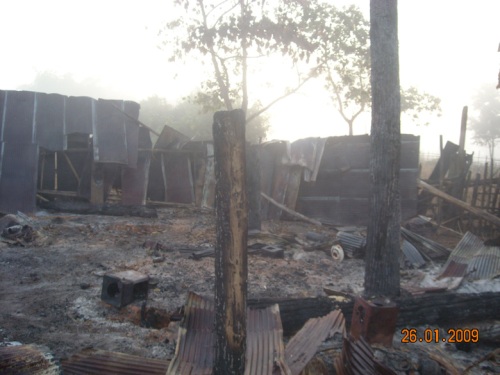
A Destroyed Mosque in Kha Law Thaw Village
The Mosque, which was more than hundred years old, was completely demolished on 2.5.2009,7:15 AM, by a group of more than fifty people led by ten armed DKBA soldiers, in Ka Tine Ki Village, which is in the township of Pharpun, in the Karen State of Myanmar.
The last and frantic appeal by the various Muslim Originations to prevent the demolishing order given by DKBA Spiritual Leader, Abbot U Thuzana of Myaing Gyi Ngu, met with the deaf ears from the Myanmar Military Junta or SPDC.
Abbot U Thuzana, allegedly had a dream that there was an old pagoda underneath the Mosque. Subsequently he had given an order to demolish the Mosque to local DKBA armed group.
Later all the Muslim groups desperately turned to the regional commander, General Zaw Min to prevent the destruction. General Zaw Min only replied that “If the Abbot wants it to be destroyed, let him do it, and we will find a new piece of land for the Mosque later”.
Local village head, Aung Myo also reminded the Muslim villagers about their shaky minority status and safety, just one day before the destruction.
This is the third Mosque destroyed by order of the DKBA Spiritual Leader, Abbot U Thuzana. The previous Mosques destroyed by his orders were at Nabu Village and Tha Khut Phoe Village.
Karens are one of the friendliest ethnic groups of Myanmar. Previously, there were no discrimination against Muslims in the Karen State until DKBA became powerful while Christian dominated KNU became weak in recent months due to systemetic onslaught of Military Junta and DKBA troups.
Buddhist Monks (Myanmar SPDC secret police/MI provocator) headed and started the anti-Muslim riots and destroyed the mosques, damaged the Quarans.
They looted the Muslim shops, houses and properties.
They assaulted, torturd and killed Myanmar Muslims.
- This rioter with the long stick has long hairs. It shows that he is not a real monk but the MI agent provocator.
- You could read about them from the US Secretary of state’s Human Rights reports.
- They were spotted waring underwear (singlets) issued as army uniform, talking on walkie-talkies (only issued to Military Intelligent agents) and even riding motor-bikes. (True monks are forbidden from riding motor-bike in Myanmar.)
- Few of them were carrying pistols. (Firearm control is very strict and ordinary citizens and the monks are forbidden from carrying guns.)
Persecution of Muslims in Burma
Historical persecution
The first instance of persecution that can be shown to have resulted from religious reasons occurred during the reign of King Bayinnaung, 1550-1589 AD. After conquering Bago in 1559, he prohibited the practice of halal, specifically, killing food animals in the name of God. He was religiously intolerant, forcing some of his subjects to listen to Buddhist sermons possibly converting by force. He also disallowed the Edil Adha, Kurbani sacrifice of cattle.The halal was also forbidden by King Alaungpaya in the 18th century.
King Bodawpaya (1782-1819) arrested four famous Myanmar Muslims Moulvis (Imams) from Myedu and killed them in Ava, the capital, after they refused to eat pork. According to the Myedu Muslims and Burmese Muslims version there were seven dark days after that execution and the king later apologized and recognized them as saints.
Religious and race riots
Under the British rule, economic pressures and xenophobia contributed to the rise of anti-Indian, and later anti-Muslim sentiment. Following an anti-Indian riot in 1930, <>
Burma for Burmese Campaign
These events led to the creation of the Burma for Burmese only Campaign, which staged a march to a Muslim Bazaar. While the Indian police broke the violent demonstration, three monks were hurt. Burmese newspapers used the pictures of Indian police attacking the Buddhist monks to further incite the spread of riots. Muslim shops, houses, and mosques were looted, destroyed, or burnt to ashes. Muslims were also assaulted and killed. The violence spread throughout Burma, with a total of 113 mosques damaged.
The Inquiry Committee by British
On 22 September 1938, the British Governor set up the Inquiry Committee. This committee determined that the real cause of the discontent toward the government was deterioration of socio-political and economic conditions in Burma. This report was also used by Burmese newspapers to incite hatred against the British, Indians, and Muslims. The Simon Commission, which had been established to inquire into the effects of the Dyarchy system of ruling India and Burma in 1927, recommended that special places be assigned to the Burmese Muslims in the Legislative Council. It also recommended that full rights of citizenship should be guaranteed to all minorities: the right of free worship, the right to follow their own customs, the right to own property and to receive a share of the public revenues for the maintenance of their own educational and charitable institutions. It further recommended Home Rule or independent government separate from India or the status of dominion.
AFPFL expelled Burma Muslim Congress
The BMC, Burma Muslim Congress was founded almost at the same time as the AFPFL, Anti-Fascist People’s Freedom League of General Aung San and U Nu before World War Two. U Nu became the first Prime Minister of Burma in 1948, following Burmese independence. U Nu decreed Buddhism as the state religion of Burma, angering religious minorities.
Muslims under General Ne Win
After the coup d’état of General Ne Win in 1962, the status of Muslims changed for the worse. Muslims were expelled from the army and were rapidly marginalized. The generic racist slur of “kala” (black) used against perceived “foreigners” gained especially negative connotations when referring to Burmese Muslims during this time. Accusations of “terrorism” were made against Muslim organizations such as the All Burma Muslim Union, causing Muslims to join armed resistance groups to fight for greater freedoms.
Anti-Muslim Riots in Mandalay (1997)
On 16 March 1997 beginning at about 3:30 p.m., following reports of an attempted rape by Muslim men, a mob of about 1,000-1,500 Buddhist monks and others gathered in Mandalay. They targeted the mosques first for attack, followed by Muslim shop-houses and transportation vehicles in the vicinity of mosques. Looting, destruction of property, assault, and religious desecration all were reported.At least three people were killed and around 100 monks arrested.
Anti-Muslim Riots in Sittwe (2001)
Tension between Buddhists and Muslims was also high in Sittwe. The resentments are deeply rooted, and result from both communities feeling that they are under siege from the other. The violence in February 2001 flared up after an incident in which seven young monks refused to pay a Muslim stall holder for cakes they had just eaten. The Muslim seller, a woman, retaliated by beating one of the novices, according to a Muslim witness. He attested that several senior monks then came to protest and a brawl ensued. One of the monks was hit over the head by the Muslim seller’s husband and started to bleed. Riots then broke out. A full-scale riot erupted after dusk and carried on for several hours. Buddhists poured gasoline on Muslim homes and properties and set them alight. More than thirty homes and a Muslim guest house were burned down. Police and soldiers reportedly stood by and did nothing to stop the violence initially. There are no reliable estimates of the death toll or the number of injuries. More than twenty died according to some Muslim activists. The fighting took place in the predominantly Muslim part of town and so it was predominantly Muslim property that was damaged.
Anti-Muslim Riots in Taungoo (2001)
In 2001,Myo Pyauk Hmar Soe Kyauk Hla Tai , The Fear of Losing One’s Race, and many other anti-Muslim pamphlets were widely distributed by monks. Distribution of the pamphlets was also facilitated by the Union Solidarity and Development Association (USDA)[63], a civilian organization instituted by the ruling junta, the State Peace and Development Council (SPDC). Many Muslims feel that this exacerbated the anti-Muslim feelings that had been provoked by the destruction of the Buddhas of Bamiyan in the Bamyan Province of Afghanistan. Human Rights Watch reports that there was mounting tension between the Buddhist and Muslim communities in Taungoo for weeks before it erupted into violence in the middle of May 2001. Buddhist monks demanded that the Hantha Mosque in Taungoo be destroyed in “retaliation” for the destruction of the Buddhas of Bamiyan.Mobs of Buddhists, led by monks, vandalized Muslim-owned businesses and property and attacked and killed Muslims in Muslim communities.On May, 15, 2001, anti-Muslim riots broke out in Taungoo, Bago division, resulting in the deaths of about 200 Muslims, in the destruction of 11 mosques, and setting ablaze of over 400 houses. On this day also, about 20 Muslims praying in the Han Tha mosque were beaten, some to death, by the pro-junta forces. On May, 17, 2001, Lt. General Win Myint, Secretary No. 3 of the SPDC and deputy Home and Religious minister arrived and curfew was imposed there in Taungoo. All communication lines were disconnected. On May 18, the Han Tha mosque and Taungoo Railway station mosque were razed by bulldozers owned by the SPDC . The mosques in Taungoo remained closed until May 2002, with Muslims forced to worship in their homes. After two days of violence the military stepped in and the violence immediately ended. There also were reports that local government authorities alerted Muslim elders in advance of the attacks and warned them not to retaliate to avoid escalating the violence. While the details of how the attacks began and who carried them out were unclear by year’s end, the violence significantly heightened tensions between the Buddhist and Muslim communities.
Agent provocateurs
While the idea of monks actually leading rioters may seem unusual, certain details make it less so. Burma’s large and much feared military intelligence service, the Directorate of Defense Security Intelligence, is commonly believed to have agents working within the monk-hood. Human Rights Watch also reported that monks in the 2001 riots were carrying mobile phones, a luxury not readily available to the Burmese population, as very few without government connections can afford them. It is also reported that there was a clear split between monks who provoked violence and those who did not. It has been suggested by Human Rights Watch and others that these facts may reflect the presence of agents provocateur among the monks.
According to Islam, it is a mandatory duty for all the Muslims
to try and stop the Evil Buddhist Terrorists in Myanmar
The most important values of Islam is, Propagating good and forbidding evil’
This is not optional but it is compulsory.
Islam makes it mandatory that we oppose evil.
We are asked to oppose evil with our hands.
Our Prophet (pbuh) has been asked by God:
“I have been ordered to dispense justice between you.”
“Whenever you judge between people, you should judge with (a sense of) justice” (4:58).
Our Prophet (PBUH) had said:
“If any one of you comes across an evil,
he should try to stop it with his hand (using force),
if he is not in a position to stop it with his hand
then he should try to stop it by means of his tongue
(meaning he should speak against it).
If he is not even able to use his tongue
then he should at least condemn it in his heart.
This is the weakest degree of faith”
(Muslim).
- “Co-operate with one another for virtue and heedfulness
- and do not co-operate with one another
- for the purpose of vice and aggression” (5:2).
This means that_
- who perpetrates deeds of vice and aggression,
- even if he is our closest relation or neighbour,
- does not have the right to win our support
- and help in the name of race, country, language or nationality.
So we hereby requested the Malaysian people, NGOs, Government to rethink about continued supporting Myanmar SPDC just because of the business interests esp PETRONAS’ investments. Then Allah will continue to ignore your plight and problems as you have done on the Myanmar Muslims.
Calling all the Christian/Muslim donors, governments /NGOs / fund managers to donate Christian KNU/KNLA to fight BUDDHIST TERRORISTS DKBA at Thai Myanmar border
We hereby made a sincere request to CIA, NATO, EU, Libya (leader Muammar Abu Minyar al-Gaddafi1), Iran (Islamic Republic of Iran’s leader president, Mahmoud Ahmadinejad), Syria (President Bashar al-Assad), Al Qaeda, Abu Sayaf group, Hisbollah, Hamas groups, Taliban, Jemaah Islamiah (JI),etc to consider supporting with financial and ammunition supports to donate Christian KNU/KNLA to fight BUDDHIST TERRORISTS DKBA at Thai Myanmar border.
Thai government should re-establish its 200 years of unofficial policy to keep Burmese rebels at its border as a first line defense from the ever aggressive Burmese Invaders. Now as other rebels such as DKBA had surrendered or are cooperating with the SPDC Myanmar Junta, so Thailand Military or Military Intelligence unit or Anti-Terrorism units should start to consider increasing their support to the remaining Christian Karen Rebels.
There are nearly thousand of Muslim members, some under 786 or Bismillah Army joining hands with the Christian Karen rebels.
There are another thousand of Muslim Shans fighting together with the Buddhist Shan rebel brothers.
There were 8000 Muslims, officially served or serving in the Christian Kachin rebel army.
So please may you all kindly donate generously, anything you could offer, to fight off the BUDDHIST TERRORISTS DKBA at Thai Myanmar border and its political and military master SPDC Junta.
Please do not try to contact me or encourage me to personally involve in the fund raising, collecting, distribution or to use as a middleman as I wish to stay away from this physical involvement and is just contributing an idea to tackle the anti-Muslim and anti-Christian terrorists.
I hope that even if there is no one interested in the above idea or suggestion, I pray that my article could at least warn SPDC Junta and Supremo Than Shwe to control that Stupid Criminal Monk, BUDDHIST TERRORISTS DKBA and other elements or factions in the military or opposition not to continue with those Racist Politics.
All democratic, civilized caring governments
should withdraw from the
MAFIA gangs of NAM, OIC and ASEAN
The birds of a feather flock together as OIC, ASEAN and NAM and all are living in glass cages (read houses), so they dare not throw stone at each other.
Inhumane, uncivilized, unjust, undemocratic, oppressive regimes from NAM, OIC and ASEAN governments gang up with the excuse of NON INTERFERENCE to get reciprocal protection from the actions of the United Nations and civilized democratic western governments.
They will surely protect the two Buddhist Terrorists of Myanmar and Seri Lanka at UN and all the International forums.
Malaysia TAMIL Nesan front-paged a report that the Government was set to back Sri Lanka’s draft resolution at the United Nations. It said the move was likely to anger the Indian community in the country.
Foreign Minister Datuk Anifah Aman, in a press statement, said that the decision to support the Sri Lankan resolution was in line with the Government’s stand of non-interference in the internal affairs of other countries.
Muslim countries must stop protecting TWO Buddhist terrorist governments of Myanmar and Sri Lanka .
Sri Lanka Buddhist terrorist government is telling the United Nations and its member nations not to interfere in the internal affairs of the country. Sound similar? Be careful, Myanmar Buddhists are singing the same tune which was supported by ASEAN, China and Russia. Many STUPID Muslim countries also supported and protected at UN.
Shame to you all! Remember? Those who protect criminals are also committing the CRIMES!
UN should immediately start, SPDC’s Abuse inquiry on Myanmar
The Harvard Law School in the US called for an inquiry into 15 years of abuses in Myanmar, like those conducted into atrocities in Darfur, Rwanda and Yugoslavia.
In a report released on Wednesday, the US college said that human rights abuses in Myanmar, “strongly suggest Burma’s military regime may be committing crimes against humanity and war crimes prosecutable under international law”.
The report by five prominent international jurists came as Myanmar’s govermment faces widespread condemnation for putting Aung San Suu Kyi on trial for breaking the terms of her house arrest after an American intruder was arrested for spending two days at her lakeside home in Yangon.
UPDATE: Now the news came out that the ‘NGA PYA GYI’, China is the arms supplier of both regimes. Chinese Government seems to be willing to sell even their mothers and sisters for prostitution if there is enough cash offer!
Buddha taught about loving kindness even on one’s enemies and all the creatures including animals. Good kind-hearted Buddhists around the world must condemn and distance themselves from the tyranny practised by Buddhist Terrorist Governments of Myanmar SPDC and Seri Lanka governments on its Religious Minority Groups such as Hindus, Christians and Muslims.
Why did Malaysia, Brunei and many Muslim countries shamelessly, inhumanely and un-Islamically vote against this UNGA resolution to protect Myanmar SPDC?
They voted against this to protect the criminal SPDC on 24 Dec 2008.
THEIR LEADERS ARE GUILTY ACCORDING TO ISLAMIC LAW AND HUMAN COMMON LAW FOR PROTECTING THE CRIMINALS.
DO THEY BELIEVE IN THE DAY OF JUDGEMENT IN-FRONT OF ALLAH?
These ASEAN COUNTRIES always shamelessly protect SPDC every where. Read the following UN document they opposed to support Myanmar Government,
United Nations General Assembly
A/RES/63/245, Distr.: General, 23 January 2009
Sixty-third session Agenda item 64 (c)
Resolution adopted by the General Assembly
[on the report of the Third Committee (A/63/430/Add.3 and Corr.1)] 63/245.
Situation of human rights in Myanmar
Agenda item 64 (c) 08-48549 The General Assembly,
Guided by the Charter of the United Nations and the Universal Declaration of Human Rights,1 and recalling the International Covenants on Human Rights2 and other relevant human rights instruments, Reaffirming that all Member States have an obligation to promote and protect human rights and fundamental freedoms and the duty to fulfil the obligations they have undertaken under the various international instruments in this field, Reaffirming also its previous resolutions on the situation of human rights in Myanmar, the most recent of which is resolution 62/222 of 22 December 2007, those of the Commission on Human Rights, and Human Rights Council resolutions S-5/1 of 2 October 2007,3 6/33 of 14 December 2007,4 7/31 of 28 March 20085 and 8/14 of 18 June 2008,6
Welcoming the statements made by the President of the Security Council on 11 October 2007 and 2 May 2008,7 Welcoming also the reports of the Special Rapporteur on the situation of human rights in Myanmar8 and his oral presentations, as well as the agreement by the Government of Myanmar to the visit of the Special Rapporteur, for the first time in four years, in November 2007 and then again in August 2008 soon after the appointment of the new Special Rapporteur, and encouraging the continuation of
1 Resolution 217 A (III).
2 Resolution 2200 A (XXI), annex.
3 See Official Records of the General Assembly, Sixty-third Session, Supplement No. 53 (A/63/53),
Calling upon the Government of Myanmar to cooperate with the international community in order to achieve concrete progress in areas such as human rights and political processes leading to a genuine democratic transition through concrete measures,
Deeply concerned that the urgent calls contained in the above-mentioned resolutions, as well as the statements of other United Nations bodies concerning the situation of human rights in Myanmar, have not been met, and emphasizing that, without significant progress towards meeting these calls of the international community, the situation of human rights in Myanmar will continue to deteriorate,
1. Strongly condemns the ongoing systematic violations of civil, political, economic, social and cultural rights of the people of Myanmar, as described in resolution 62/222 and the previous resolutions of the General Assembly, the Commission on Human Rights and the Human Rights Council;
2. Expresses grave concern, in particular, at:
(a) The continuing practice of enforced disappearances, use of violence against peaceful demonstrators, rape and other forms of sexual violence, torture and cruel, inhuman or degrading treatment, arbitrary detentions, including those that resulted from the repression of peaceful protests in 2007, the extension, once again, of the house arrest of the General Secretary of the National League for Democracy, Daw Aung San Suu Kyi, as well as the high and increasing number of political prisoners, including other political leaders, persons belonging to ethnic nationalities and human rights defenders, despite the recent release of a small number of them, including U Win Tin;
(b) The continuing imposition of severe restrictions on the exercise of fundamental freedoms such as the freedom of movement, expression, association and assembly, in particular the lack of an independent judiciary and the use of censorship;
(c) The major and repeated violations of international humanitarian law committed against civilians;
(d) The continuing discrimination and violations suffered by persons belonging to ethnic nationalities of Myanmar, and attacks by military forces and non-State armed groups on villages in Karen State and other ethnic States in Myanmar, leading to extensive forced displacements and serious violations and other abuses of the human rights of the affected populations;
(g) The climate of impunity due to the fact that perpetrators of human rights violations and abuses are not brought to justice, thereby denying the victims any effective remedy; ….
4. Strongly calls upon the Government of Myanmar:
(a) To ensure full respect for all human rights and fundamental freedoms, including by ending restrictions on these freedoms that are incompatible with the obligations of the Government of Myanmar under international human rights law, and to protect the inhabitants of the country;
(b) To allow a full, transparent, effective, impartial and independent investigation, primarily by the Special Rapporteur on the situation of human rights in Myanmar, into all reports of human rights violations, including enforced disappearances, use of violence against peaceful demonstrators, arbitrary detentions, torture and cruel, inhuman or degrading treatment, rape and other forms of sexual violence, forced labour and forced displacement, and to bring those responsible to justice in order to end impunity for violations of human rights;
(e) To fully implement previous recommendations of the Special Rapporteur, the General Assembly, the Human Rights Council, the Commission on Human Rights, the International Labour Organization and other United Nations bodies;
(h) To cooperate fully with the Special Rapporteur, including by granting him full, free and unhindered access in his upcoming visits to Myanmar to monitor the implementation of Human Rights Council and General Assembly resolutions, and to ensure that no person cooperating with the Special Rapporteur or any international organization is subjected to any form of intimidation, harassment or punishment;
(k) To take urgent measures to put an end to violations of international human rights and humanitarian law, including the targeting of civilians by military operations, rape and other forms of sexual violence persistently carried out by members of the armed forces, and the targeting of persons belonging to particular ethnic groups;
(l) To end the systematic forced displacement of large numbers of persons within their country and the violence contributing to refugee flows into neighbouring countries, and to respect ceasefire agreements;
5. Calls upon the Government of Myanmar:
(a) To permit all political representatives and representatives of ethnic nationalities to participate fully in the political transition process without restrictions and, to that end, to resume without further delay a dialogue with all political actors, including the National League for Democracy and representatives of ethnic nationalities;
(c) To allow human rights defenders to pursue their activities unhindered and to ensure their safety, security and freedom of movement in that pursuit;
(d) To refrain from imposing restrictions on access to and flow of information from the people of Myanmar, including through the openly available and accessible use of Internet and mobile telephone services;
(e) To fulfil its obligations to restore the independence of the judiciary and due process of law, the current state of which is not in compliance with international human rights law, as well as to ensure that discipline in prisons does not amount to torture or cruel, inhuman or degrading treatment or punishment and that conditions of detention otherwise meet international standards;
(f) To engage in a dialogue with the Office of the United Nations High Commissioner for Human Rights with a view to ensuring full respect for all human rights and fundamental freedoms;
………….
74th plenary meeting
24 December 2008
Human Rights Watch, World Report 2009 – Burma
Human Rights Watch, World Report 2009 – Burma, 14 January 2009. Online.
Events of 2008
Burma’s already dismal human rights record worsened following the devastation of cyclone Nargis in early May 2008. The ruling State Peace and Development Council (SPDC) blocked international assistance while pushing through a constitutional referendum in which basic freedoms were denied.
The ruling junta systematically denies citizens basic freedoms, including freedom of expression, association, and assembly. It regularly imprisons political activists and human rights defenders; in 2008 the number of political prisoners nearly doubled to more than 2,150. The Burmese military continues to violate the rights of civilians in ethnic conflict areas and extrajudicial killings, forced labor, land confiscation without due process and other violations continued in 2008.
The SPDC subsequently relaxed restrictions on some agencies and enabled helicopters and boats to operate more freely. But two months after the cyclone an estimated 700,000 people had received no aid whatsoever because of SPDC obstruction.
While some UN agencies and international NGOs have reported continuing travel restrictions and obstructions, others say they have been permitted free travel and unfettered operational space. Pro-government organizations such as the Myanmar Red Cross and the Union Solidarity and Development Association operate extensively in the Irrawaddy Delta, but some private civil society efforts have been either discouraged or co-opted by the authorities.
In cyclone-affected areas, there have been reports of land confiscations, forced labor, and forced evictions of displaced people by Burmese authorities.
Human Rights Defenders
Intimidation of political activists and human rights defenders increased in 2008. The number of political prisoners rose from 1,100 in mid 2007 to over 2,150 in late 2008.
Continuing Violence against Ethnic Groups
The Burmese military continues to attack civilians in ethnic conflict areas, particularly in Karen State and Shan State. Abuses such as forced labor, sexual violence against women and girls, extrajudicial killings, torture and beatings, and confiscation of land and property are widespread. In 2008 army counterinsurgency tactics and security operations for infrastructure developments displaced more than 40,000 civilians in these two areas.
There are an estimated 450,000 to half a million internally displaced people in eastern Burma. The Burmese army and non-state armed groups extensively use landmines, including near civilian settlements and food production sites – a clear violation of international humanitarian law.
In Arakan State in western Burma, the Rohingya Muslim minority faces widespread rights violations including religious persecution, forced relocation, land seizures, and denial of citizenship and identity papers.
Refugees and Migrant Workers
Thousands of Burmese refugees and migrant workers continue to travel to Bangladesh, India, Thailand, Malaysia, and Singapore where they face abuses and harassment. Some 140,000 refugees remain in nine camps along the Thai-Burma border. Over 50,000 refugees have been resettled in third countries such as the United States, Canada, Australia, and Norway since 2004.
The UN special rapporteur on human rights in Burma, Tomas Ojeá Quintana conducted a five-day official visit to Burma in August 2008. Quintana’s visit was tightly managed by the SPDC; including a tour of the cyclone-affected Irrawaddy delta, and meetings with government-screened political prisoners, Burmese officials, pro-SPDC political parties, and civil society organizations. Quintana expressed cautious optimism about engaging the SPDC on improving the human rights situation.
After Cyclone Nargis, the international community reacted with shock and anger at the SPDC’s reluctance to allow international aid and aid workers into affected areas, with the French government raising the “Responsibility to Protect” principle and arguing for international intervention to assist victims. A European Parliament resolution “strongly condemned” the disruption of cyclone aid, referred to the referendum as “implausible,” and directly warned that further blockades by the SPDC should result in a charge of crimes against humanity and Burma’s referral to the International Criminal Court.
China, Russia, India, and Thailand continue to provide diplomatic support for the SPDC and are major trade and investment partners. Foreign investment in Burma’s oil and natural gas sector increased in 2008, particularly in connection with a major offshore gas project led by a Korean consortium and a planned overland pipeline to the Burma-China border. Sales of natural gas account for the largest share of the SPDC’s revenue.
Countries including Australia, Canada, the European Union, Switzerland, and the US continue to impose targeted sanctions on Burma. In July 2008, the US updated its sanctions on Burmese leaders and close business allies by adding Burmese military conglomerates and related companies. It also tightened its gem embargo, making imports of Burmese rubies and jade illegal even if processed in other countries. In August, President George Bush met with exiled Burmese dissidents in Thailand.
Human Rights Watch, World Report 2009 – Burma. UNHCR Refworld, available at: http://www.unhcr.org/refworld/docid/49705faac.html [accessed 31 January 2009]
Human Rights Watch, World Report 2009 – Burma
Human Rights Watch, World Report 2009 – Burma. UNHCR Refworld, available at: http://www.unhcr.org/refworld/docid/49705faac.html [accessed 31 January 2009]
The official complaint letter in Burmese language to the Senior General Than Shwe by the Five Myanmar Islamic Organizations’ Chiefs
Sunni Mosque of Molmein Mosque in Kengtung
Mosque in Kengtung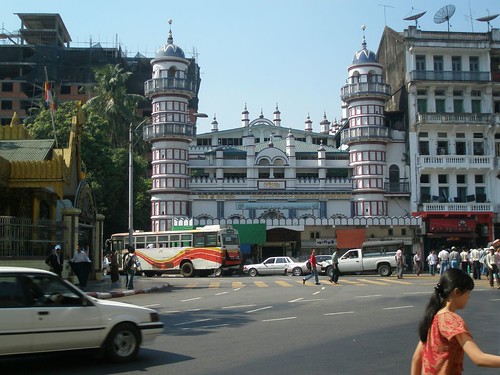 A mosque in Yangon
A mosque in Yangon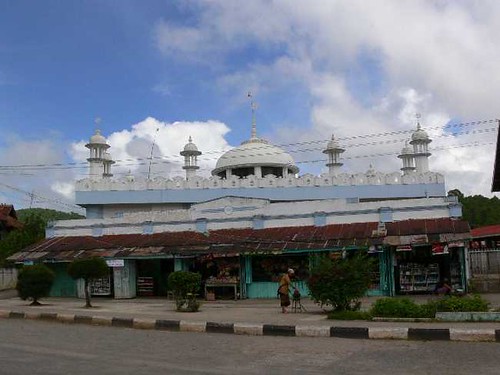
Kalaw Mosque
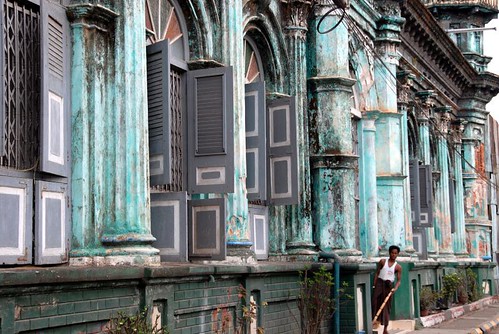

Muslim Boys Outside Their Mosque

Mosque – Bhamo, Myanmar Burma
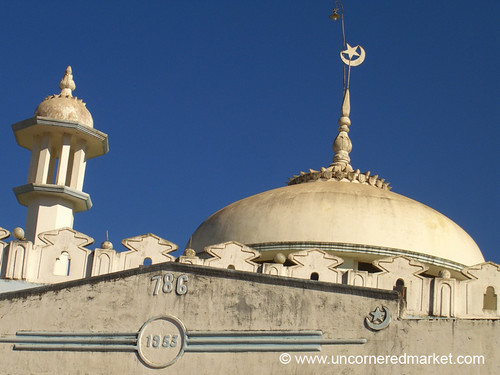
This mosque is in Kalaw, Burma (Myanmar).
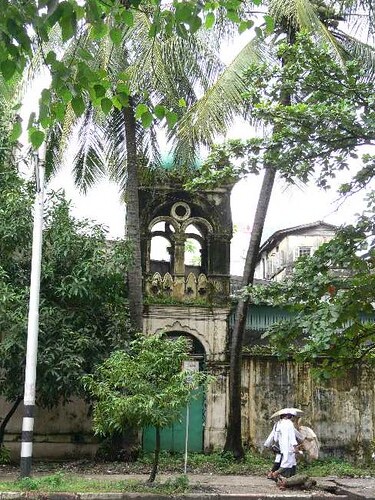
One of many mosques in Yangon, Myanmar
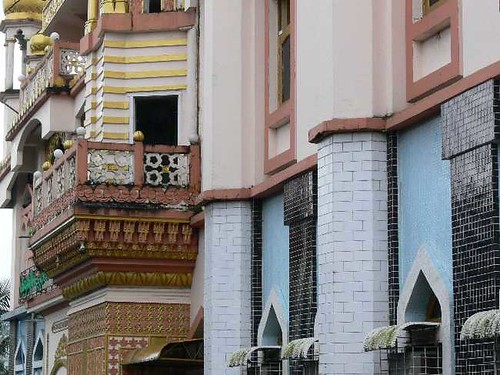
One of many mosques in Yangon, Myanmar
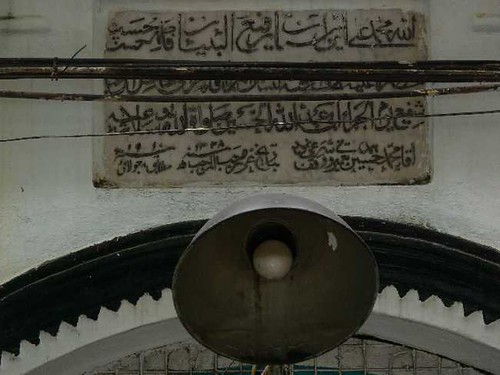
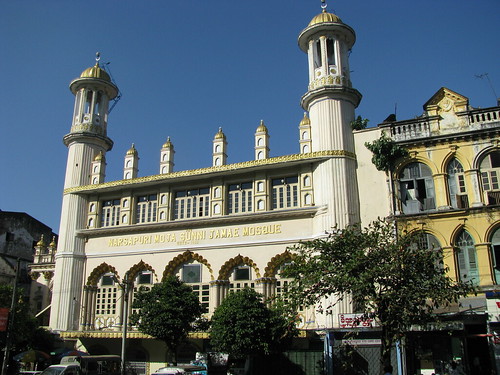

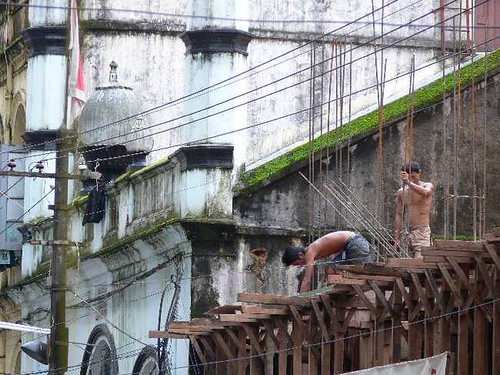
Filed under: Burma






 Burma Young Islamic Center
Burma Young Islamic Center

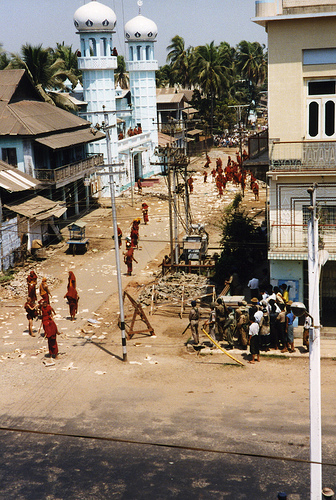
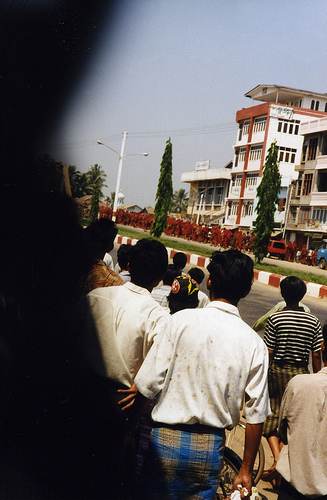
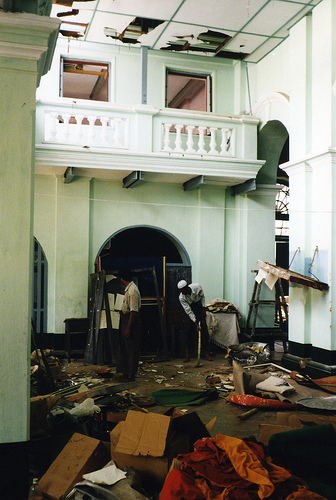
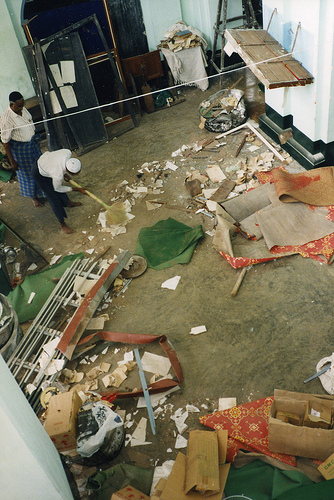
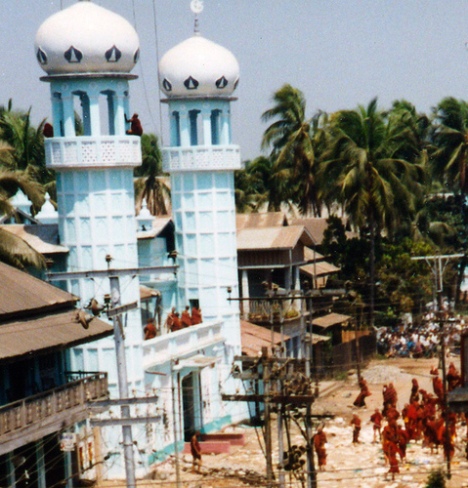
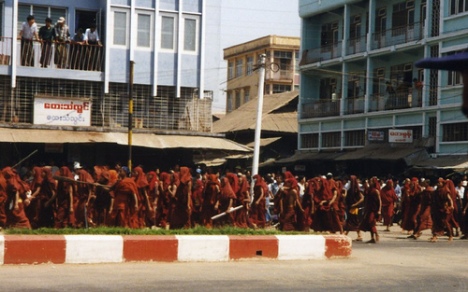
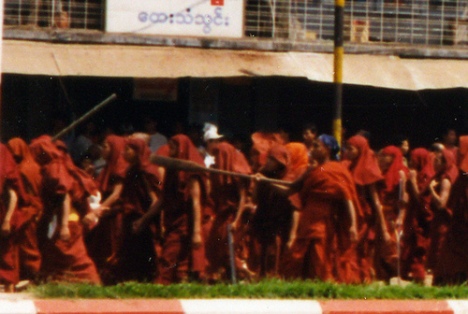
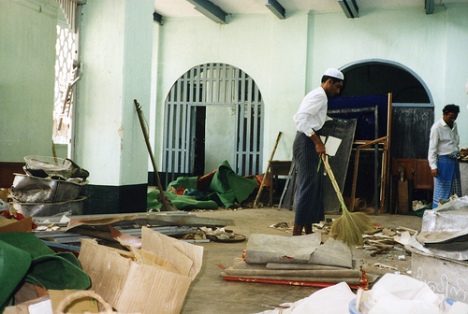
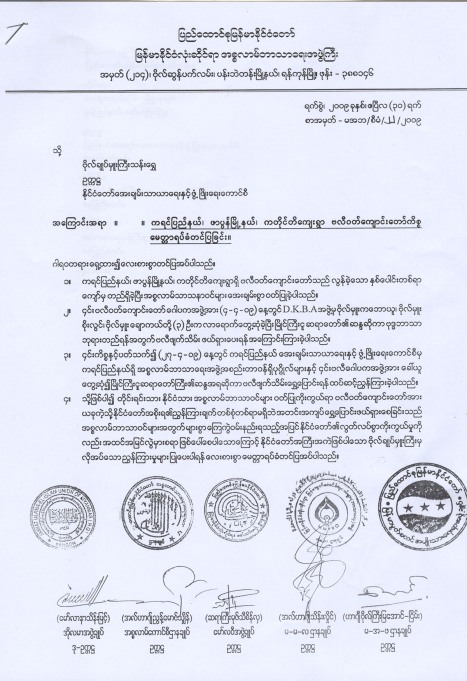

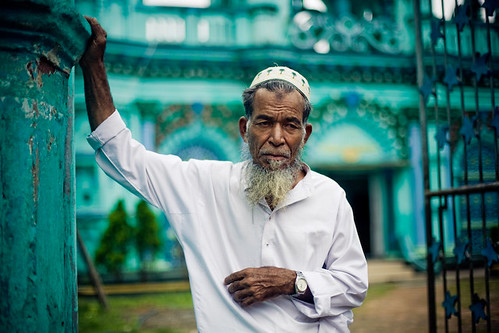

 Posted in:
Posted in: 

0 comments:
Post a Comment
Burma Youth's Islamic Center